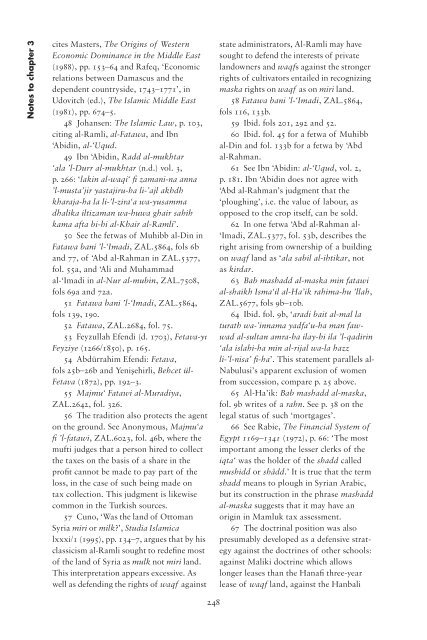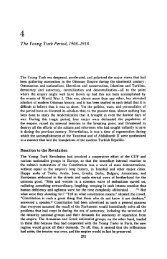Governing property, making the modern state - PSI424
Governing property, making the modern state - PSI424
Governing property, making the modern state - PSI424
Create successful ePaper yourself
Turn your PDF publications into a flip-book with our unique Google optimized e-Paper software.
Notes to chapter 3<br />
cites Masters, The Origins of Western<br />
Economic Dominance in <strong>the</strong> Middle East<br />
(1988), pp. 153–64 and Rafeq, ‘Economic<br />
relations between Damascus and <strong>the</strong><br />
dependent countryside, 1743–1771’, in<br />
Udovitch (ed.), The Islamic Middle East<br />
(1981), pp. 674–5.<br />
48 Johansen: The Islamic Law, p. 103,<br />
citing al-Ramli, al-Fatawa, and Ibn<br />
‘Abidin, al-‘Uqud.<br />
49 Ibn ‘Abidin, Radd al-mukhtar<br />
‘ala ’l-Durr al-mukhtar (n.d.) vol. 3,<br />
p. 266: ‘lakin al-waqi‘ fi zamani-na anna<br />
’l-musta’jir yastajiru-ha li-’ajl akhdh<br />
kharaja-ha la li-’l-zira‘a wa-yusamma<br />
dhalika iltizaman wa-huwa ghair sahih<br />
kama afta bi-hi al-Khair al-Ramli’.<br />
50 See <strong>the</strong> fetwas of Muhibb al-Din in<br />
Fatawa bani ’l-‘Imadi, ZAL.5864, fols 6b<br />
and 77, of ‘Abd al-Rahman in ZAL.5377,<br />
fol. 55a, and ‘Ali and Muhammad<br />
al-‘Imadi in al-Nur al-mubin, ZAL.7508,<br />
fols 69a and 72a.<br />
51 Fatawa bani ’l-‘Imadi, ZAL.5864,<br />
fols 139, 190.<br />
52 Fatawa, ZAL.2684, fol. 75.<br />
53 Feyzullah Efendi (d. 1703), Fetava-yı<br />
Feyziye (1266/1850), p. 165.<br />
54 Abdürrahim Efendi: Fetava,<br />
fols 25b–26b and Yenişehirli, Behcet ül-<br />
Fetava (1872), pp. 192–3.<br />
55 Majmu‘ Fatawi al-Muradiya,<br />
ZAL.2642, fol. 326.<br />
56 The tradition also protects <strong>the</strong> agent<br />
on <strong>the</strong> ground. See Anonymous, Majmu‘a<br />
fi ’l-fatawi, ZAL.6023, fol. 46b, where <strong>the</strong><br />
mufti judges that a person hired to collect<br />
<strong>the</strong> taxes on <strong>the</strong> basis of a share in <strong>the</strong><br />
profit cannot be made to pay part of <strong>the</strong><br />
loss, in <strong>the</strong> case of such being made on<br />
tax collection. This judgment is likewise<br />
common in <strong>the</strong> Turkish sources.<br />
57 Cuno, ‘Was <strong>the</strong> land of Ottoman<br />
Syria miri or milk?’, Studia Islamica<br />
lxxxi/1 (1995), pp. 134–7, argues that by his<br />
classicism al-Ramli sought to redefine most<br />
of <strong>the</strong> land of Syria as mulk not miri land.<br />
This interpretation appears excessive. As<br />
well as defending <strong>the</strong> rights of waqf against<br />
248<br />
<strong>state</strong> administrators, Al-Ramli may have<br />
sought to defend <strong>the</strong> interests of private<br />
landowners and waqfs against <strong>the</strong> stronger<br />
rights of cultivators entailed in recognizing<br />
maska rights on waqf as on miri land.<br />
58 Fatawa bani ’l-‘Imadi, ZAL.5864,<br />
fols 116, 133b.<br />
59 Ibid. fols 201, 292 and 52.<br />
60 Ibid. fol. 45 for a fetwa of Muhibb<br />
al-Din and fol. 133b for a fetwa by ‘Abd<br />
al-Rahman.<br />
61 See Ibn ‘Abidin: al-‘Uqud, vol. 2,<br />
p. 181. Ibn ‘Abidin does not agree with<br />
‘Abd al-Rahman’s judgment that <strong>the</strong><br />
‘ploughing’, i.e. <strong>the</strong> value of labour, as<br />
opposed to <strong>the</strong> crop itself, can be sold.<br />
62 In one fetwa ‘Abd al-Rahman al-<br />
‘Imadi, ZAL.5377, fol. 53b, describes <strong>the</strong><br />
right arising from ownership of a building<br />
on waqf land as ‘ala sabil al-ihtikar, not<br />
as kirdar.<br />
63 Bab mashadd al-maska min fatawi<br />
al-shaikh Isma‘il al-Ha’ik rahima-hu ’llah,<br />
ZAL.5677, fols 9b–10b.<br />
64 Ibid. fol. 9b, ‘aradi bait al-mal la<br />
turath wa-’innama yadfa‘u-ha man fawwad<br />
al-sultan amra-ha ilay-hi ila ’l-qadirin<br />
‘ala islahi-ha min al-rijal wa-la hazz<br />
li-’l-nisa’ fi-ha’. This <strong>state</strong>ment parallels al-<br />
Nabulusi’s apparent exclusion of women<br />
from succession, compare p. 25 above.<br />
65 Al-Ha’ik: Bab mashadd al-maska,<br />
fol. 9b writes of a rahn. See p. 38 on <strong>the</strong><br />
legal status of such ‘mortgages’.<br />
66 See Rabie, The Financial System of<br />
Egypt 1169–1341 (1972), p. 66: ‘The most<br />
important among <strong>the</strong> lesser clerks of <strong>the</strong><br />
iqta‘ was <strong>the</strong> holder of <strong>the</strong> shadd called<br />
mushidd or shâdd.’ It is true that <strong>the</strong> term<br />
shadd means to plough in Syrian Arabic,<br />
but its construction in <strong>the</strong> phrase mashadd<br />
al-maska suggests that it may have an<br />
origin in Mamluk tax assessment.<br />
67 The doctrinal position was also<br />
presumably developed as a defensive strategy<br />
against <strong>the</strong> doctrines of o<strong>the</strong>r schools:<br />
against Maliki doctrine which allows<br />
longer leases than <strong>the</strong> Hanafi three-year<br />
lease of waqf land, against <strong>the</strong> Hanbali












